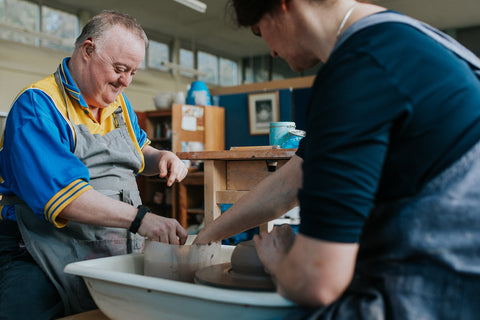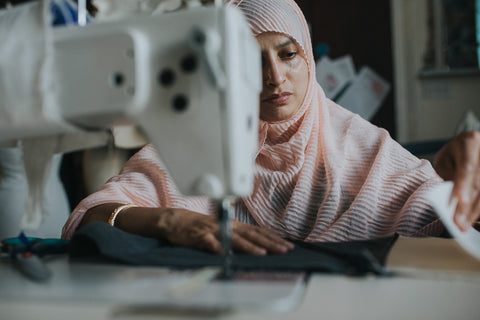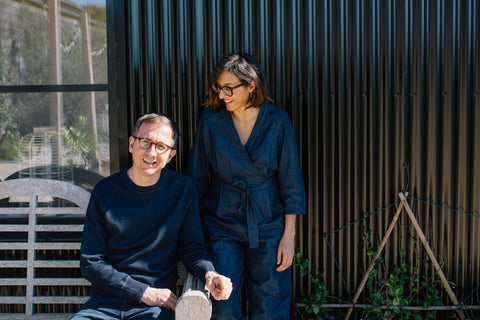Makers
We work with a range of makers from around the UK, most often via the charities and social enterprises that support them. This model ensures that our sometimes vulnerable makers have people to advocate for and support them effectively, while Aerende provides a reliable and compassionate source of meaningful work, joy and revenue for these wonderful supporting organisations.
Candles
Our candles are all made by a social firm that provides safe and caring employment for people with learning disabilities. Service users work as part of a team in the company’s factory in Powys to make a range of candles and related products. To see the exclusive products this team have made for us, click here.
Our candles are all made by a social firm that provides safe and caring employment for people with learning disabilities. Service users work as part of a team in the company’s factory in Powys to make a range of candles and related products. To see the exclusive products this team have made for us, click here.
Pottery
We work with several groups of talented potters.
We work with several groups of talented potters.
Our stoneware mugs, beakers, plates and bowls are made by adults with learning disabilities who are receiving residential support at Camphill Village Trust's Grange Village in Gloucestershire. At this residential community, adults get the opportunity to feel valued and to gain independence through the development of craft skills. Their beautiful airy pottery looks out over the Severn Hills and we think their work has a calming, natural quality. Look carefully and you might spot the initials of the maker on the underside of the product.
Our china clay porcelain, candle holders and small jugs are made in the nurturing environment of Studio 306, which supports people recovering from mental health illnesses in north London. Each item is carefully shaped by hand and often decorated with found objects in a process designed to boost confidence and nurture creativity.
Our jugs, serving bowls, teapots and mugs are all made in Derbyshire at the Parkwood centre for adults with learning disabilities (pictured below). Its ethos is to celebrate and develop skills of the pottery team through creativity and team work while creating pieces of art that can be used every day.

Textiles
Our bed linen, lightshades and macramé plant hangers are made at FabricWorks, an inspiring London-based social enterprise supporting isolated women into learning new skills and employment. At its headquarters in East London, women facing multiple disadvantages are supported on free programmes that provide in-depth training in sewing, machining and garment making, and offer individual one-to-one support for complex issues. Courses are designed to raise aspirations, confidence, skills and well-being for women that need it most. In some cases, women enrolled are suffering depression, are survivors of trafficking, have limited English or little/no education. The courses holistically enhance skills for future employment, either with the FabricWorks production team or in the wider textile industry, or in other avenues of employment.
Our bed linen, lightshades and macramé plant hangers are made at FabricWorks, an inspiring London-based social enterprise supporting isolated women into learning new skills and employment. At its headquarters in East London, women facing multiple disadvantages are supported on free programmes that provide in-depth training in sewing, machining and garment making, and offer individual one-to-one support for complex issues. Courses are designed to raise aspirations, confidence, skills and well-being for women that need it most. In some cases, women enrolled are suffering depression, are survivors of trafficking, have limited English or little/no education. The courses holistically enhance skills for future employment, either with the FabricWorks production team or in the wider textile industry, or in other avenues of employment.

Our napkins are all sewn at Making For Change, a training and manufacturing unit within HMP Downview prison in Sutton, Surrey. Created in partnership with the London College of Fashion, the project aims to increase wellbeing and reduce reoffending rates amongst participants by equipping them with professional skills and qualifications in a supportive environment. Statistics show that upon leaving prison women are less likely than men to find employment. Making For Change, offers on the job training working within a professional environment to live industry briefs whilst gaining Level 1 and 2 ABC awards in Fashion & Textiles – replicating up-to-date production methods and offering links to potential employers on release.
Our cushions are made by people recovering from mental health illnesses at Studio 306 in north London. They are made from upcycled and sustainable materials, and filled with ethical British wool inserts on a programme created to boost confidence and nurture creativity.
Brass
Our hand-hammered brass dishes, hoops and napkin rings (coming later in 2019) are made in the nurturing environment of Studio 306, which supports people recovering from mental health illnesses in north London.

Wood & paper
Our wood and paper/printed products come from a range of makers.
Our wood and paper/printed products come from a range of makers.
Our chopping boards are all made in Scotland at a lovely site called River Garden Wood. At this residential site, adults are trained in the art of woodwork and horticulture carving as part of a programme to assist the recovery of people in the early stages of recovery from drug and/or alcohol addiction. Every product helps increase self-belief and employability which is why every item comes with the tag stating the name of its maker. The wood itself is all grown on site and, as items are made almost entirely by hand, the environmental impact is virtually zero – people power at its finest.
Our clothes racks in leather and wood are made by adults with learning disabilities at Botton Village, a nurturing residential community that is part of the in Yorkshire. Their ethos is to empower individuals and celebrate ability by building relationships and providing purposeful activity.
Our prints are created by Moments of Sense and Style in Somerset. After Rob (below, left) suffered a near fatal brain haemorrhage and stroke in 2014, he and his partner Syreeta (below, right) began sharing their story through scented products - to align with brain injury recovery and trigger senses. Artwork followed as Rob recovered, and it gave him purpose, first as a means of communication and therapy and, now for pleasure too. His pieces are symbolic of beauty, courage, strength and hope.

Our wooden bowls and platters are made by volunteers at Landworks on the Dartington Estate in Devon, an independent charity providing supported routes via landscaping and woodwork, into employment and community for those in prison or at risk of going to prison.
Our spatulas are made in Shropshire at Designs In Mind, a creative studio supporting people with mental health illnesses via creative art and design projects.
Espadrille slippers
Our espadrilles are handmade in London from waste leather as part of a project supporting low-income women in Tower Hamlets. Many of the women face a number of barriers to full-time work including social exclusion, limited language skills, and low levels of education. Juta works alongside other programmes (including English classes, Keep Fit, IT sessions and a women’s discussion group designed to build skills and confidence) to raise self-esteem, provide meaningful work and encourage active participation in community and aid integration in society. Profit from each pair of espadrilles goes back to the women who make them, as a pot of money that can be spent on the activities and support they choose, and as a sustainable and supported route to employment.
Our espadrilles are handmade in London from waste leather as part of a project supporting low-income women in Tower Hamlets. Many of the women face a number of barriers to full-time work including social exclusion, limited language skills, and low levels of education. Juta works alongside other programmes (including English classes, Keep Fit, IT sessions and a women’s discussion group designed to build skills and confidence) to raise self-esteem, provide meaningful work and encourage active participation in community and aid integration in society. Profit from each pair of espadrilles goes back to the women who make them, as a pot of money that can be spent on the activities and support they choose, and as a sustainable and supported route to employment.

Soap
We work with two soap makers in the UK.
Real Inspiration is based near Hitchin, Hertfordshire, and aims to help people deal with daily stress and low level anxiety through creative activities, breathing techniques and simple brain training exercises. For Aerende, it is working with young people with disabilities to create a range of zero-waste artisan soap bars, scented with essential oils.
The Soap Co is the positive luxury arm of the charity Clarity. It employs blind or otherwise disabled people to produce our unique soap pebbles, designed and made in the Lake District.

